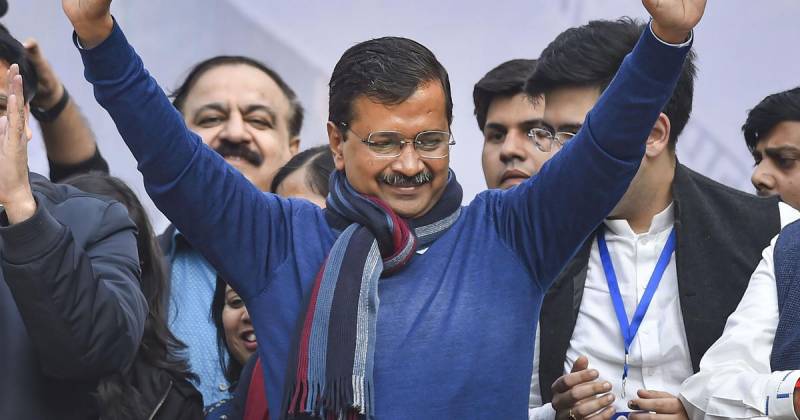Kejriwal’s soft Hindutva outsmarts BJP in Delhi
By Jinka Nagaraju
Ever since Aam Admi Party (AAP) scored a stunning victory bagging 62 seats of 70 members in Delhi Assembly, analysts have been trying hard to discover the mantra that helped chief minister Arvind Kejriwal to defeat the mighty BJP.
A common thread that runs across all these commentaries is Kejriwal’s soft Hindutva. Delhi election was a contest between two right-wing parties-AAP and BJP. Finally it was AAP which stole the show.
According to this argument, AAP is a moderate Hindutva party while the BJP is a well-known Hindu Nationalist party. The voters of Delhi favoured the moderate Hindutva party as it suits their sensibilities.
So, they argue that AAP’s victory in the elections is not an ideological defeat for BJP and there is nothing for the liberals to celebrate about the outcome of Delhi elections.
If one sees the evolution of Kejriwal’s politics, from his rabid anti- Modi hostility to his support for abrogation of article 370, one can easily understand how he softened his anti-Modi rhetoric and added Hindutva element to the campaign in order to please Delhi voters, who mostly love to sail with BJP. And he succeeded.
Aam Admi Party (AAP) contested Delhi assembly elections in 2013 and won 28 out of 70 seats. Congress, led by its then Chief Minister Sheila Dikshit ended up winning only 8 seats in Delhi assembly polls. It extended support to AAP to form the minority government.
The government did not last for more than 2 months as Congress withdrew its support. Congress felt that without power Kejriwal would suffocate and it could fill in the space.
In 2014, Kejriwal contested seven Lok Sabha seats and lost all of them to the BJP. In 2015, Kejriwal dissolved the Assembly and went in for snap polls. He got 67 seats out of 70, while BJP got only 3 seats.
This forced Kejriwal to adopt a very hostile attitude towards Narendra Modi and the BJP. Delhi is a union territory with limited autonomy. Many powers vest with the Government of India. Crucial departments such as home, housing (DDA), CPWD are directly controlled by the Centre. Having won an absolute majority, Kejriwal started demanding state-like autonomy for the Delhi government.
Kejriwal crossed swords with the Lt. Governor, Delhi Police Commissioner and the Election Commission of India and went to the extent of staging dharnas. Kejriwal was in the news almost every day for being an activist rather than a chief minister.
He fought 2019 Lok Sabha elections with the same belligerence. He tried desperately for an alliance with the Congress Party. But the Congress was not interested.
In 2019, Lok Sabha election, BJP won all 7 seats with 56 percent vote share. The Congress came second with 22 percent of the vote and Kejriwal stood third with 18 percent.
This defeat forced Kejriwal to change his tack from a crying child to a chief minister.
“Kejriwal had championed minority causes since 2013. In that quest, Kejriwal even went to Varanasi and fought against Narendra Modi. Postmortem of his defeat revealed that the entire minority vote in Delhi shifted to the Congress party. This shocked Kejriwal,” said noted political commentator Dr Pentapati Pulla Rao.
The fear that he might be defeated in the coming Assembly elections compelled Kejriwal to reinvent his politics to face Delhi voters.
According to Rao, seven changes in his strategy helped AAP steal the BJP thunder.
“The first thing Kejriwal did was to call on Prime Minister Narendra Modi on June 20, 2019 . Kejriwal also stopped fighting with the Lt. Governor and other central ministers. Kejriwal also announced support for the abrogation of Article 370 when all opposition parties opposed it. As for CAA and National Register for Citizens, Kejriwal was less noisy unlike others. Kejriwal neither directly supported Shaheenbagh nor visited the protest site. He talked of the temple, Hanuman Chalisa and gave nationalist slogans, which was not his habit before 2019,” Rao said.
With this policy change coupled with quality governance and schemes like free-travel for women in Delhi buses, even the traditional Narendra Modi and BJP voters found no reason not to re-elect him.